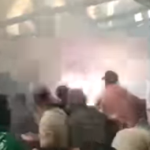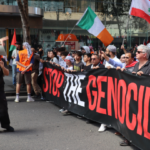Israel’s Terrorism Attack on Lebanon Sets Precedent for Future Commercial Device Attacks

At around 3.30 pm on Tuesday in Lebanon, pagers belonging to Hezbollah-affiliated individuals peeped as a message arrived that served to garner attention and explode the devices that had been tampered with prior to purchase, so that they acted as lethal bombs triggered to go off together, with the aim of attempting to murder or to maim the owner, but potentially harming anyone in sight.
As of Wednesday local time, 12 Lebanese people had been killed and 2,800 wounded across Lebanon by the pager attack, as devices exploded in pockets and in faces, on the streets and in shopping malls. And unlike an assassination, which calls for precision, this act targeted whoever had the pager at the time of explosion, regardless of what they were doing and whom they were with.
This has all the hallmarks of state terrorism. Under Australian law, terrorism is defined as politically, ideologically or religiously motivated violence, or threat of it, which is intended to harm or coerce the government or a foreign government or the pubic, including a foreign public.
And while the attack appeared to target Hezbollah operatives, it clearly had reach over the general public in Lebanon and could be seen to exert a coercive pressure on the nation’s government.
This clear violation of international humanitarian law has been blamed on Israel, as Hezbollah, a political party and paramilitary group, has been trading attacks with Tel Aviv from southern Lebanon since 8 October, in regard to the genocidal actions of Israel in Gaza. And while Israel has not claimed responsibility, it is not in the habit of doing so in terms of targeted attacks on foreign soils.
The pager attack also set a new precedent whereby governments might interfere with commercial goods to attack foreign populations, which is what has occurred despite the apparent targeting of only Hezbollah actors.
And just to reinforce the point that these are some more of the new rules in international combat being established by the Netanyahu government, it did it again the next day.
“A countrywide act of terrorism”
Another coordinated attack occurred on Wednesday across Lebanon as hundreds of walkie-talkies exploded wounding 450 people and killing at least 20, which has led to headlines suggesting Lebanon is on the brink of war, which clearly reveals the political motivation behind the attack.
At least one of the hand-held radio devices that exploded did so close to a funeral that was being held for an 11-year-old boy, who had been killed in the pager attack, the BBC reported, and it added that locals were later warning its crew not to use any devices, like mobile phones, as panic spread out amongst the population. And the boy was one of two children killed in the pager attack.
Taiwanese company Gold Apollo denied having produced the 300 pagers sold to Hezbollah, but rather claimed a Hungarian company with the rights to use its logo produced them, while Icom, the Japanese company whose logo was on the devices that exploded on Wednesday, said that it had discontinued making the model of walkie-talkie involved back in 2014.
But the general consensus is that Israeli operatives tampered with both sets of devices and triggered them remotely to explode. And the initial pager attack occurred the day after the US warned Israel not to escalate the conflict with Hezbollah in Lebanon, which has resulted in thousands having evacuated their homes in the region where fighting is occurring.
“The Israelis launched what can only be described as a countrywide act of terrorism against the Lebanese people,” Rania Khalek, the Lebanese American journalist, outlined on Tuesday. And she went on to explain that Hezbollah is not just a military group but it’s also a political party, who’ve been elected to government”, which means some pagers belonged to politicians and civilians.
Forbidden under international law
Lebanese journalist Mohammed Kliet described the scene in Beirut to Democracy Now, outlining that on Wednesday morning Lebanese time the nation was still in a state of shock. And he explained that members of the general public were standing “frozen” on the streets, especially in the southern suburbs of the city, as these explosions went off terrorising everyone who was out for the day.
“They were falling down on the streets in their thousands,” the independent journalist added. “The minister of health has counted around 1,850 persons were injured… in Beirut in general.” And he explained that about 2,000 people were hospitalised, with 450 suffering critical injuries, and that he understood not many of the pagers belonged to military personnel.
While Human Rights Watch researcher Ramzi Kaiss went on to explain that from a human rights framework “the law of armed conflict is clear, as it prohibits the use of boobytraps or apparent harmless devices that civilians could be attracted to or that civilians use, precisely in order to avoid the harm that we saw unfold in Beirut yesterday”.
Rule 80 of international humanitarian law states that “the use of booby-traps which are in any way attached to or associated with objects or persons entitled to special protection under international humanitarian law or with objects that are likely to attract civilians is prohibited.”
Condemning the entire globe
Of course, Israel doesn’t abide by such law. The nation has made that blatantly clear to the globe for the past 11 months, and whilst this might always have been the case, never before has the nation perpetrated such atrocities as have been occurring in the Gaza Strip over close to a year now, with civilians undeniably being targeted in the killing, whilst 2.3 million people are being starved.
Four healthcare workers were killed in the pager attack. Medics are protected persons under international law. But Israel has targeted over 500 Palestinian healthcare workers in Gaza since last October, as well as having laid siege to the region’s entire healthcare network, launching military attacks on one hospital after another as if patients and staff were enemy combatants.
Indeed, while Israel has been committing genocide, crimes against humanity and war crimes on entire groups and terror acts on foreign nations, the Netanyahu government is further tearing down these international norms with the US, Australia and much of the globe doing little to prevent this, which is destroying a sense of humanity that international humanitarian law is supposed to maintain.
And it’s just as Egyptian-American comedian Bassem Youssef wrote on X in the aftermath of the pager attack, “and suddenly my phone, our security system, my kid’s tablets are time bombs that detonate at the whims of one country.”
Although this incident has also made it easier for any nation going into the future to engage in such random terror attacks via the weaponisation of consumers goods: a precedent now twice set.







